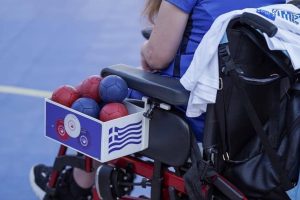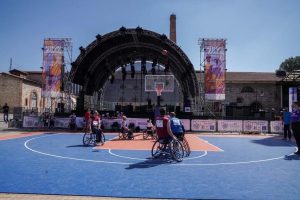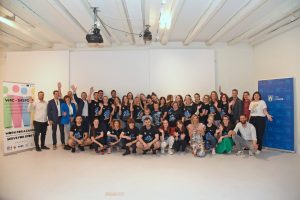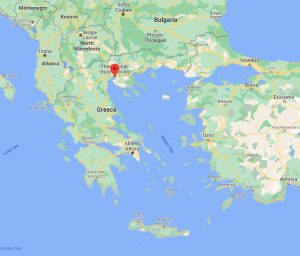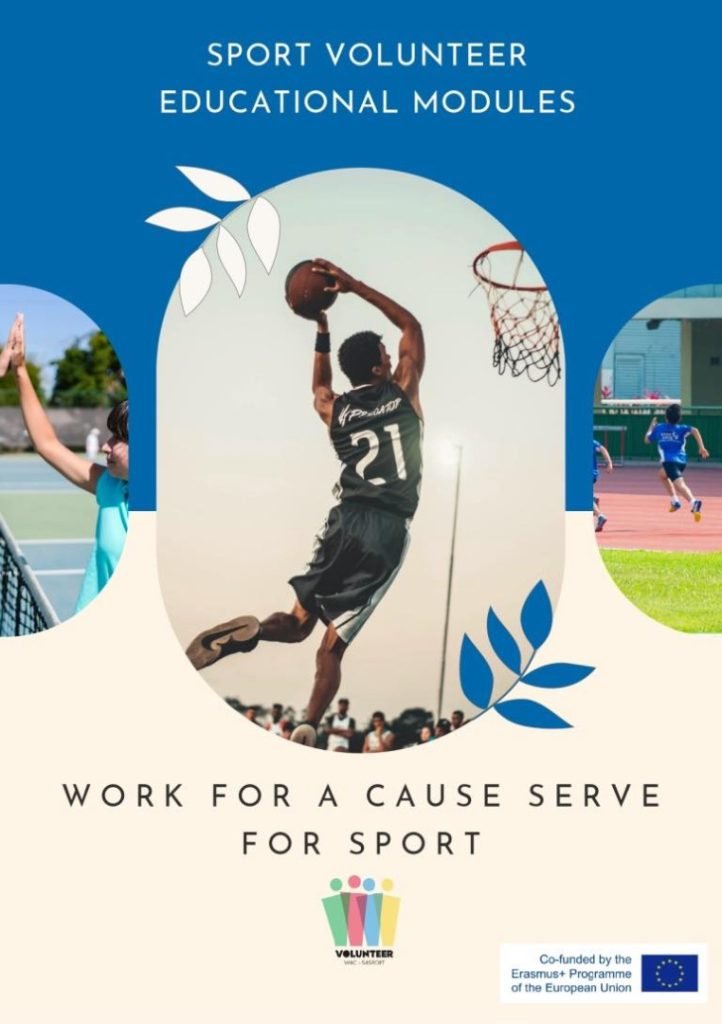The organization of every sports event/competition requires the engagement of volunteers. Volunteers are fundamental to the success of international and domestic sports events. Sports event organizers rely on the knowledge, skills and experiences of volunteers. The scale of volunteer involvement in sports events is significant, creating the potential for a wide range of economic, social, cultural and community benefits. In most Member States, the sports movement would not exist without volunteering.
About Work for a cause, serve for sport
Volunteers and community involvement lie at the very heart of any truly successful sporting event. Volunteers can provide the most basic of labour (e.g. handing out water and prize bags, set-up and clean-up) and can also be a great source of expertise needed by organisations.
The economic value of volunteer contributions is significant and well-recognised. According to Sport England1 “….Voluntary contribution to the sport is of such a scale that when quantified it outstrips all other voluntary activity and dwarfs the amount of paid employment in sport.” The goal of the “Work for a cause, serve for sport” project is to educate and equip volunteers for participating in the organization of national and international sporting events and also to equip volunteers for assisting people with disabilities in sporting events thus fostering social inclusion and equal opportunities in sport.
As part of this project, the Institute for Social Innovation and Cohesion organized a Conference & Workshop on volunteering in sports events for people with special needs.
At the event, the project was presented, and the president of the disabled sports club “I Floga”, the mayor’s adviser on disabled issues spoke. It was followed by a workshop entitled “Necessary skills for volunteers in sports events” and a rowing workshop for people with special needs.
Improving volunteering opportunities in sports
Even though there are local and national volunteer organizations in project partner countries, none of them is specifically focused on sports. A number of competitions from local to world level are held in all partner countries, but each sports club or sports organization engage and educates volunteers for their own needs. This way, volunteers will be able to take part in sports events in different sports and in sports for persons with disabilities, which has multiple benefits for both organizers and volunteers.
- Developing an educational module for Sports events/competitions for persons with disabilities
Within this specific module, we will educate volunteers to become sports assistants for persons with disabilities. Volunteers can aid with things like the build-up and tear down of equipment and events, registration, support staff for participants, and getting players and family or friends around the event campus and also assist the persons with disabilities in performing sports activities.
- Appointment of Sports Volunteers Coordinator
They will gather data from all educated volunteers from each project country (personal information and contacts – all collected and processed according to the GDPR). They will become a contact point for various organizers of sports events and sports organizations on local, regional and national levels from project counties who wish to involve educated volunteers in their sports event activities, thus assuring the participation of quality volunteers and assuring the sustainability of the project results. This will be done through Sports Volunteer Application.
- Development of Sports Volunteer Application
Data from all educated volunteers from each project country will be gathered by each project partner (Sport Volunteers Coordinators). This will allow various sports organizations on local, regional and national levels from project counties to involve educated volunteers in their sports event activities, thus assuring the participation of quality volunteers and assuring the sustainability of the project results. Through the development of a mobile application, we will provide users (both organizers of sports events and volunteers) with all available information about upcoming sports events in need of volunteers and vice versa, on educated volunteers who passed project educational training on volunteering in sport. The application will include all necessary contacts, names of organizers of sports events, event descriptions, requested volunteer jobs/positions, maps, addresses, telephone numbers etc. This project is to bring about new cooperation and a transnational information-sharing model for local professionals working on volunteering in sports.
Networking of volunteers not only at the national level but also at the European level
- Participating in the organization of sports events/competitions
Volunteers will gain new knowledge, opportunity and motivation to become permanent members of sports associations and help them to achieve their goals
- Development of Sports Volunteer Guidelines
The evaluation of the Sports Volunteer Educational Modules will be done by surveying the target group in order to ensure the sustainability of the project and to have indicators of the success and relevance of the project. Received survey data, including Sports Volunteer Educational Modules and other project results will be used for the development of guidelines for future activities to promote volunteering in sports.
These project-specific objectives are:
- Strengthening the capacity of volunteers to participate in sports events/competitions, therefore, increasing the number of volunteers educated to support sports events/competitions for persons with and without disabilities
- Promoting volunteering in a specific sporting context
- Facilitate accessibility of volunteer services for organizers of sports events by developing the international Sports Volunteer Application
- Strengthening the capacity of organizers of sports events for recruitment of volunteers and volunteer management. Through this practice, an attempt is made to define and cultivate the necessary skills that volunteers should have when participating in sports events for people with disabilities. Often the volunteers who are called to staff the sports events, do not have the necessary knowledge, so they do not know exactly how to manage it.
The event was open to the public, and as a result, a lot of people learned about the project and its objectives. Local NGOs attended and they’re going to use this practice for their events, also a lot of volunteers attended and also public authorities. The target group of this project are volunteers and organizations of sports events/competitions such as sports organizations (from small clubs to large associations and federations), civil society organizations and local government. Organizations of sports events/competitions are facing difficulties when recruiting and retaining volunteers. Besides, volunteers are often discouraged to participate in sports events due to a lack of quality training for them.
Duration of the Good practice
April 2022 – ongoing
The main institution in charge of the Good practice
Municipality of Zagreb
Andreja Pintar
T: +385 916 100 127
www.facebook.com/workforacauseserveforsport
The geographical scope of the Good practice
Regional
Location of the Good practice
Thessaloniki, Greece
Resources needed
To successfully implement the conference you will need a team of highly dedicated people. In our case, the event was organised by a team of 5. Their work was co-founded by the Erasmus+ sports program. 2OOO € were spent on this activity.
Evidence of success
The participation at the conference was very good. 150 people attend the conference and 56 volunteers participated in the workshop. After that, the feedback that our organisation took was very good and volunteers asked us for more information and more projects that they could be involved with.
Challenges encountered
We didn’t meet any challenges during the implementation of this activity. Everything was great to set and people were really interested. But as with any event, things can go wrong. We have prepared for the following trouble:
- Rental space availability,
- Covid limitations on travel and organisation of events
- Technical equipment issues
- Time management and good relations within the organising team
Potential for transfer
The sports and physical activity sector relies heavily on volunteers to ensure that activities and events take place and are enjoyed. Being a volunteer enables individuals to be part of the environment and benefit without necessarily taking part in an activity. For providers, having a diverse volunteer workforce of different ages, ethnicities and impairments ensures a wider range of experience and knowledge. This encourages creativity and innovations, their delivery more enjoyable and exciting.
The valuable contribution volunteers bring to society is being more and more recognized. As all levels of government become more engaged in supporting active citizenship, volunteering is promoted as one of the best examples of how individuals can make a meaningful contribution to a civil society with volunteering seen as an important expression of citizenship and fundamental to democracy. Consequently, numerous recent policy developments have been initiated to promote volunteering and improve the volunteering infrastructure.
How to start?
Funding
The Conference & Workshop on volunteering in sports events for people with special needs was funded by European Commission and Erasmus+ on behalf of the project “Work for a cause, serve for sport”.
Partners
The project Work for a cause, serve for sport is implemented by 6 partners from 5 countries (City of Zagreb, Croatia; The Social Innovation and Cohesion Institute (Fifty – Fifty), Greece; Gea Societa’ Cooperativa Sociale, Italy; Municipality of Almussafes, Spain; Drustvo za razvijanje prostovoljnega dela Novo mesto (DRPDNM), EUSA Institut, Slovenia).
In all partner countries there are local and national volunteer organizations, however, none of them is specifically focused on sports. A number of competitions from local to world level are held in all partner countries, but each sports club or sports organization engage and educates volunteers for their own needs. This way, volunteers will be able to take part in sports events in different sports and in sports for persons with disabilities, which has multiple benefits for both organizers and volunteers.
Volunteer training
For the Conference and workshop, there weren’t any needed training sessions, as it was an open workshop for volunteers, and it was about the necessary skills that volunteers in sports events need. It was actually the first introduction of the project. Although one of the project’s outputs is the creation of educational modules about volunteers in sports events.
However, during the project duration material for non-formal education of volunteers in sports will be prepared and 3 educational modules will be designed. To design modules that address the needs of volunteers follow these steps:
- Form a group of experts
- Analyse the current situation in each country.
- Development of educational modules
- Local events to engage volunteers and local stakeholders
- Volunteers’ workshops on the necessary skills that they should have when facilitating sports events.
- Collect volunteers’ data
- Create a database of volunteers to facilitate organisations’ events when needed.
- Provide volunteers with certificates to motivate them.
Our Modules will be focused on:
Module 1: Sports events – logistics support for the organisation of sports competition
This module will cover a wide range of jobs and activities for volunteers that serve as a tool to help organize sports competitions/events. It is important to emphasize that a model of this kind of logistic support can be used in any sports competition. The module will cover non-formal education for volunteers on the following services: opening and closing ceremonies; volunteer services programme; hospitality; accommodation; Info desk and accreditation; promotion and PR; transportation; storage; venue management – access control/parking, crowd control; special needs – wheelchair access, ramps, toiles for disabled, parking for disabled; seating capacities; services: power, water, gas, emergency generator, lighting, refrigeration, decoration, signs, dressing rooms, telephones and internet lines, mix zone, janitorial and maintenance, etc; competition assignments (entries, start lists, results, jury area, scoring, scoreboards, warm-up area, schedule, equipment and supplies).
Module 2: Sports assistant for persons with disabilities
Within this module, volunteers will be educated to become sports assistants for persons with disabilities.
Module 3: Volunteer Management – educational module for sports event organizers
Volunteer management is only one part of major sports event management, and the focus tends to be on determining at the outset where volunteers are needed and how many are required, then recruiting, training, and managing those volunteers to ensure the event is a success. The module will be focused on: finding and recruiting volunteers; animations; selection criteria; volunteer education; descriptions of volunteer teams; descriptions of volunteer positions; volunteer involvement; test events; coordination before and during sports events/competition.
